Niko J. Kallianiotis is a Pennsylvania-based photographer and educator. Kallianiotis grew up in Greece and has spent his adult life in New York and Pennsylvania. Through his first monograph, America in a Trance, Kallianiotis explores Pennsylvania’s industrial regions — intersections of coal/steel industry, local business, small town values, and political discourse — in illustrating the “faded American dream.” Kallianiotis teaches at Drexel University (Philadelphia, PA) and the University of Scranton. More information on Niko J. Kallianiotis and his first monograph can be found by visiting his website: http://www.nikokallianiotis.com
Rachel: Can you tell me a little bit about your background — your upbringing, how did you become a photographer?
Niko J. Kallianiotis: I was not brought up in an artistic environment which, after some thinking, I feel [isn’t] a necessary ingredient for the recipe. I picked up a camera for the first time when I was about twenty-one years old, so you can say I immersed myself in the photographic medium at an older age. I was fortunate that I started my career as a newspaper photographer in Pennsylvania, Ohio and New York because working both on local and national stories influenced and inspired my photography. It was an educational experience for me; those past memories and experiences, together with my current work in America, [were] an educational experience. It taught me, on a personal level of course, about what America is, or isn’t.
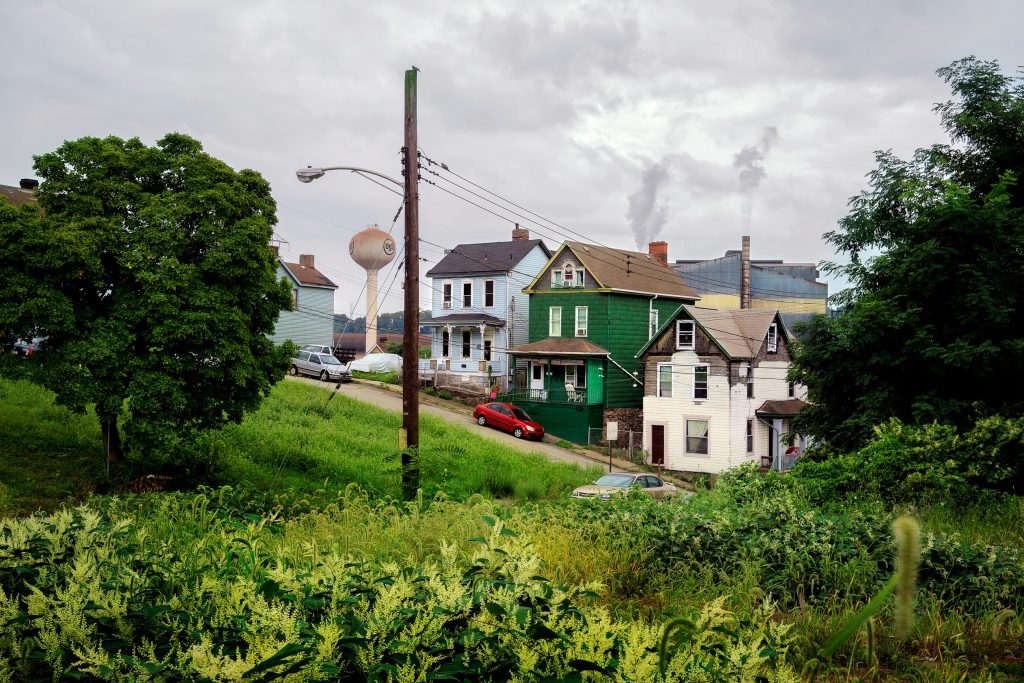
Rachel: What were the inspirations and motivations behind the America in a Trance project?
Niko J. Kallianiotis: My work is about my journey from my old neighborhood under the Parthenon in Greece, to the Big Apple, to the foothills of Pennsylvania. It’s about longing to find a home that may not exist anymore. It’s about an identity that may be somewhere in between one that is tattered and latently manifested and one affected by the immersion of two cultures. As a youngster, I perceived the United States mostly from the big Hollywood screen experience and the adventures of “Harley Davidson and the Marlboro Man.” My subject choices derive from intuition and the desire to explore the unknown and rediscover the familiar. Through form, light, and color I let the work develop organically reflect the place but also of one’s self. The hues work as the constituent of hope, but also of home, of the Motherland.
America in a Trance dives into the heart and soul of the Pennsylvania industrial regions, a place where small-town values still exist and sustainable small businesses that once thrived under the sheltered wings of American industry. It was here, the cradle of American industrialism, that immigrants from tattered European countries once crossed the Atlantic for a better future.
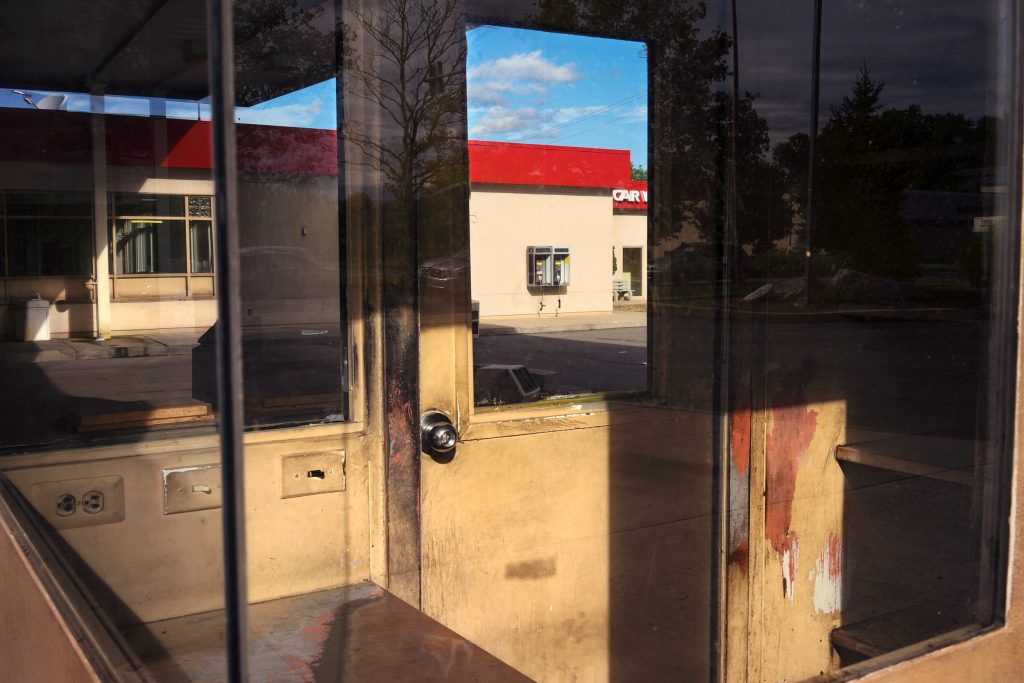
Whether it is the hard Pennsylvania coal towns to the East, the shadows of looming steel stacks to the West, or every faded American dream in between, each photograph becomes a mirror, some sort of a confession, a personal statement. The work is ultimately about my personal struggles of assimilation, of striving to understand by visually inquiring about me, but also about you, the viewer. I perceived both as a personal visual anthology with socio-economic and cultural connotations, but most of all, the goal is to inquire and engage in a dialogue about where this country, and more specifically the formerly industrial regions, are heading to. I am really not interested in how we got here, we kind of all know that; I am interested in what will become of this integral vein of America that once provided oxygen to small communities, from the workforce to commerce. The excuses from political and economic leaders are plenty, as are for those who abide to a particular political party. I came to America as a kid from Athens and without hesitation I call it crimes against humanity on a social level. It may sound harsh, but one only needs to get in their car and take a drive, look, talk and feel.
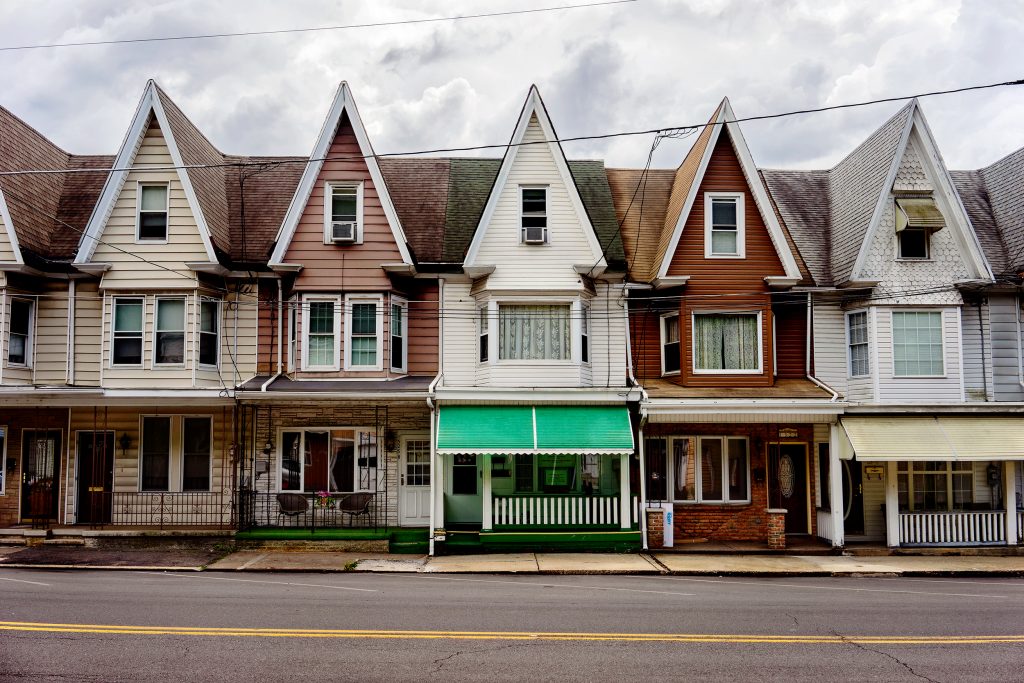
Rachel: You’ve spoken about “America in a Trance” as giving the viewer the lens of seeing America from an immigrant’s perspective. How did your perceptions of the United States as a “beacon of mobility” change from Athens to NYC to Pennsylvania?
Niko J. Kallianiotis: I consider myself fortunate that I have experienced living in both a metro area, New York City, which was also my first home in the States two decades ago, but also in small communities in the rural part of the country, many years and currently in Northeastern Pennsylvania.
Although I spent half of my life in downtown Athens, I have a much more intimate connection with rural American, the former Industrial Belt,, but in general small communities much more than New York or any metro area for that matter. New York City really does nothing for me, but it’s almost everyone’s dream or maybe it once was when I lived in Greece. I don’t see the hype and the most fascinating thing is that one could get a much more raw version of America just two hours away from the city. Another fascinating fact is that many who live in a metro area, and we are using New York here as an example, have never experienced how it is to open the door of your car under zero degrees weather in January and step foot in Homestead, Pennsylvania just to see how it feels, to talk to people, to feel the land, to understand by inquiring themselves and to make a decision about a place without their television’s influence.
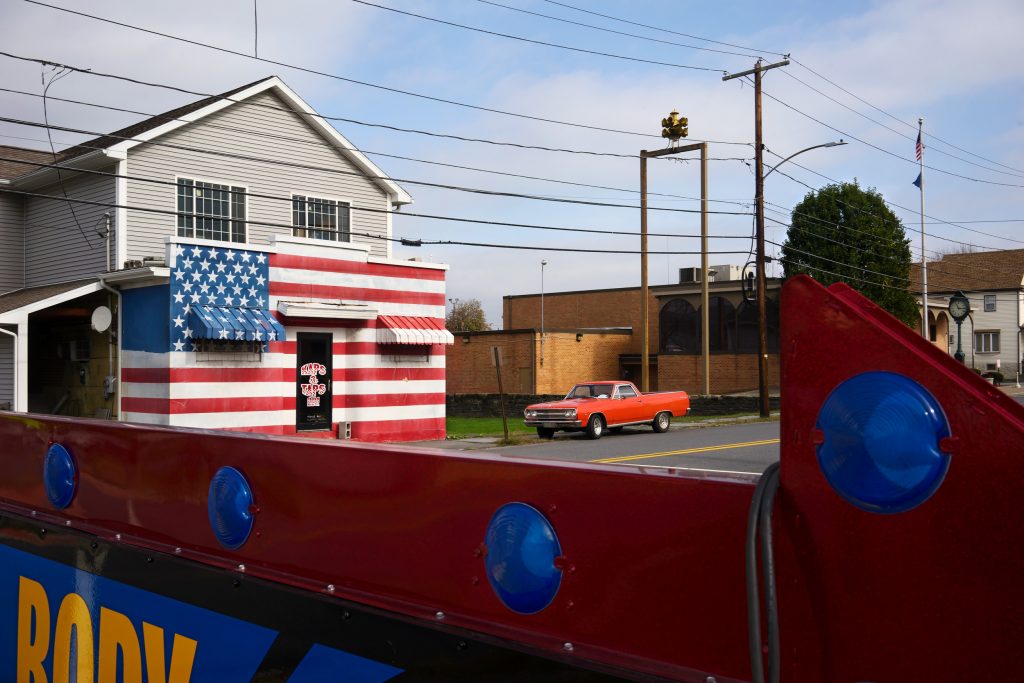
Rachel: As this is a personal project, what has it meant for your understanding of your own community as well as your role in it? How has your relationship changed or deepened with the land?
Niko J. Kallianiotis: It goes back to [being] there, evaluating land and self but above all listen[ing] to the derelict structures. The first time I visited western Pennsylvania, and specifically McKeesport located south of Pittsburgh, I was in complete awe. I sat near the bus station as I entered the town for about an hour, looking without making a photo but evidently I did. Greece has some major economic problems, but the desolation and abandonment of these regions, the Rust Belt, is indeed a vast region and is pretty apocalyptic and, in my book, unacceptable. There have been some articles about how Braddock, Penn., is seeing better times because a couple of artists did some work there and a fancy restaurant opened downtown, but it’s comical and a fantasy. I have been there several times and unfortunately, the situation is dire.
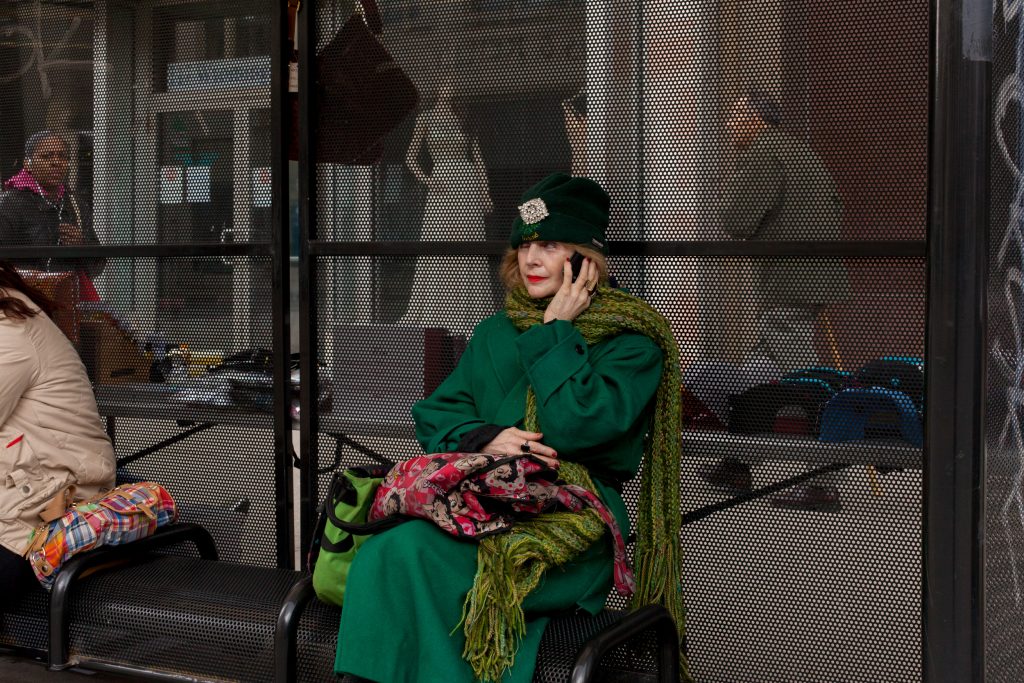
Rachel: What is the commentary you are looking to communicate through your work?
Niko J. Kallianiotis: I am deeply concerned about the future of former industrial regions. What will happen to them, what is their destiny and the responsibility of the government both on a national and local level? One of the most fascinating structures in these towns is the permanently closed bank with classical revival decor — [a] statement of power stoically standing still as the local tavern. I want to communicate the voices, the smells, the grinding of the machinery and the loneliness of the souls walking along the tattered sidewalks.
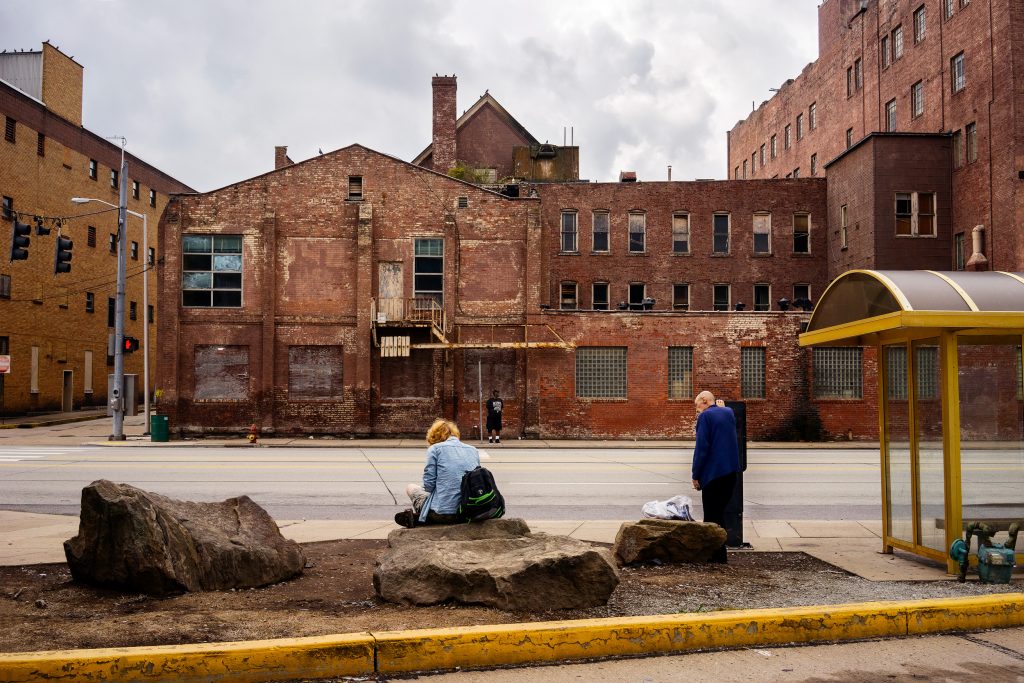
Rachel: Can you share some highlights from the book? Are there any experiences you had speaking with people or places you visited that were surprising or feel particularly consequential?
Niko J. Kallianiotis: The overall experience of producing the work, being out in the field and getting a first-hand account of the struggles, hopes, values, and peculiar characteristics are all consequential. I have learned that regardless of the color of your skin, your political affiliations [or] your life values, we are all in this together and [although] I am a loud Greek with a heavy accent, visiting some very rough parts of the state was [never] an issue. People are willing to speak with you, share their stories, ideas and values, and so does the land and that smokey loud lunch counter in Alliquipa, Pennsylvania. The nuts and bolts of the machinery that build the country and the world are full of loud conversations that are now silent, because some capitalist decided it would be better for the bank account.
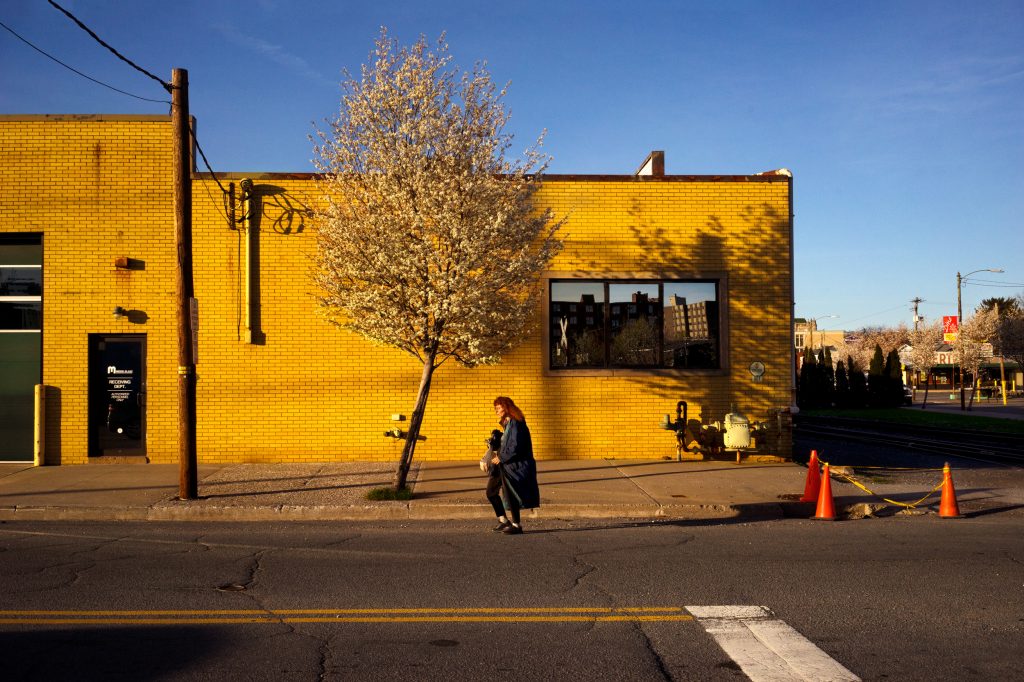
Rachel: I understand that “America in a Trance” is not meant to be a political work; how were you able to then represent the polarization and difference in politics through the context of mobility in these towns?
Niko J. Kallianiotis: I started the project before the political spectacle of 2016 but unavoidably have fallen into the wave of politics because Pennsylvania, and in general the Rust Belt regions, became of higher importance to both political campaigns and of course the media. I had a slight issue of how the people living and working in these regions were represented by the media which follows a parachute perspective when represent[ing] this land. Over and over the same caricature [was] becoming more frequent and so was the story behind the images, not only towards the people but also towards the land. The values and the way of life that support the industry that harms the environment is condemned and so are the people who are pulling its weight. It’s not as simple when you need to put food on the table.
When you don’t want to move to a metro area because you like your town, you should be able to have that choice but unfortunately your choices are limited. Asking middle-aged people who work at a factory that is about to close in one week to become an environmental scientist or learn how to code is ridiculous and unrealistic. If someone goes to West Virginia and asks a coal miner to make solar panels and still make 50-60K a year to live respectively, I do not believe they would decline because they would rather go underground and dig coal. We live in an open market and an utterly capitalist society so that ship has long sailed and we need to come to the realization that whether it be a solar panel or an environmentally friendly equipment of some sort, the narrative is, unfortunately, the same kind of a pessimistic one. One thing is for certain though; services will not get you far, you need some sort of industry, not coal or steel or anything else that is so harmful towards the environment, but something to keep the wheels spinning, to let people live in dignity. About a year or so ago a mattress factory in Delano, Pennsylvania closed and hundreds of people were told not to return to work. Some of their concerns were “what do we do?,” “where do we go from here?” People worked there all their lives and those lives were shattered in one day. That is where the government should come in, that is what democracy is, but capitalism and open markets, unfortunately, are not.
